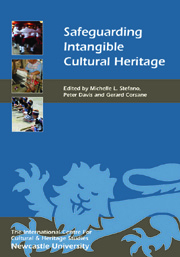Book contents
- Frontmatter
- Contents
- List of Illustrations
- Acknowledgments
- Touching the Intangible: An Introduction
- NEGOTIATING AND VALUING THE INTANGIBLE
- 1 The Paradoxes of Intangible Heritage
- 2 Memory, Museums and the Making of Meaning: A Caribbean Perspective
- 3 From Intangible Expression to Digital Cultural Heritage
- 4 Conversation Piece: Intangible Cultural Heritage in Sweden
- 5 Africa's Rich Intangible Heritage: Managing a Continent's Diverse Resources
- 6 The Silence of Meanings in Conventional Approaches to Cultural Heritage in Jordan: The Exclusion of Contexts and the Marginalisation of the Intangible
- 7 Conversation Piece: Intangible Cultural Heritage in India
- APPLYING THE INTANGIBLE CULTURAL HERITAGE CONCEPT
- ON THE GROUND: SAFEGUARDING THE INTANGIBLE
- List of Contributors
- Index
5 - Africa's Rich Intangible Heritage: Managing a Continent's Diverse Resources
from NEGOTIATING AND VALUING THE INTANGIBLE
Published online by Cambridge University Press: 05 February 2013
- Frontmatter
- Contents
- List of Illustrations
- Acknowledgments
- Touching the Intangible: An Introduction
- NEGOTIATING AND VALUING THE INTANGIBLE
- 1 The Paradoxes of Intangible Heritage
- 2 Memory, Museums and the Making of Meaning: A Caribbean Perspective
- 3 From Intangible Expression to Digital Cultural Heritage
- 4 Conversation Piece: Intangible Cultural Heritage in Sweden
- 5 Africa's Rich Intangible Heritage: Managing a Continent's Diverse Resources
- 6 The Silence of Meanings in Conventional Approaches to Cultural Heritage in Jordan: The Exclusion of Contexts and the Marginalisation of the Intangible
- 7 Conversation Piece: Intangible Cultural Heritage in India
- APPLYING THE INTANGIBLE CULTURAL HERITAGE CONCEPT
- ON THE GROUND: SAFEGUARDING THE INTANGIBLE
- List of Contributors
- Index
Summary
INTRODUCTION
Africa is a continent endowed with a diverse and rich heritage that ranges from the cultural and natural to the immovable, movable and intangible. These manifestations are often intertwined through ways of living, believing, healing, dying and celebrating, to name a few. Most importantly, the heritage of Africa is also brought to life through the partnership of nature and culture, where the intangible gives meaning to the tangible and both provide africa with its rhythmic cycles of life.
For centuries, Africa's diverse intangible heritage has shaped the world through processes such as diffusion, acculturation and influence, as well as through the movements of its peoples. The ICH of the continent is represented through a multitude of traditions, practices and beliefs. In particular, it can be found in the knowledge and wisdom of its elders, artists, artisans, builders and musicians, among many others. It can also be located in its poems and in the rhythms of its drumbeats, or in the sites of memory, historical landscapes and works of art.
Moreover, the ICH of the African continent, as dynamic and rhythmic as it is, is also delicate and fragile after suffering centuries of discrimination, destruction and displacement under colonialism and religious Puritanism. Yet, it is this very ICH that still defines the continent's many faces; it maintains cultural diversity in the face of numerous challenges posed by a fast, globalising world.
- Type
- Chapter
- Information
- Safeguarding Intangible Cultural Heritage , pp. 57 - 70Publisher: Boydell & BrewerPrint publication year: 2012



